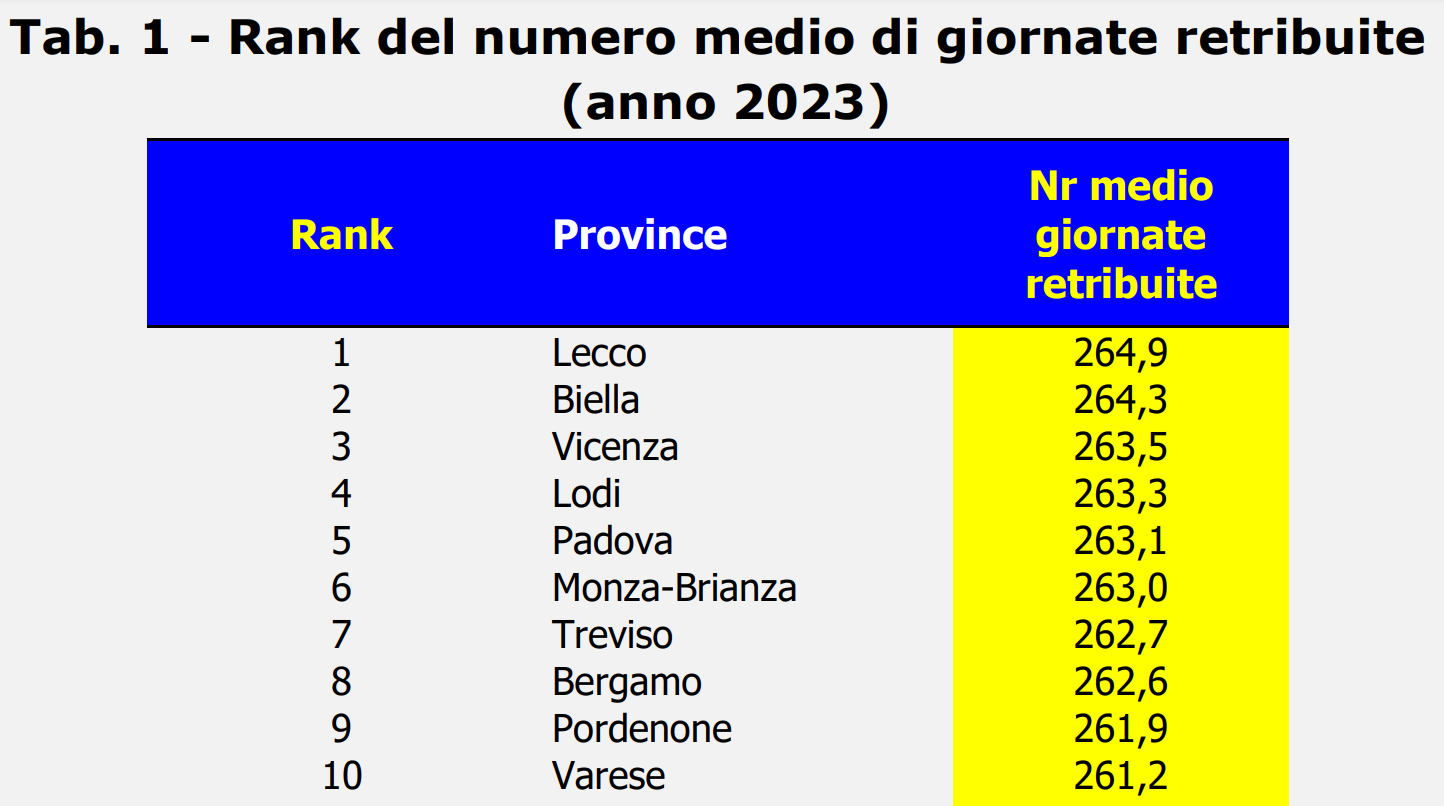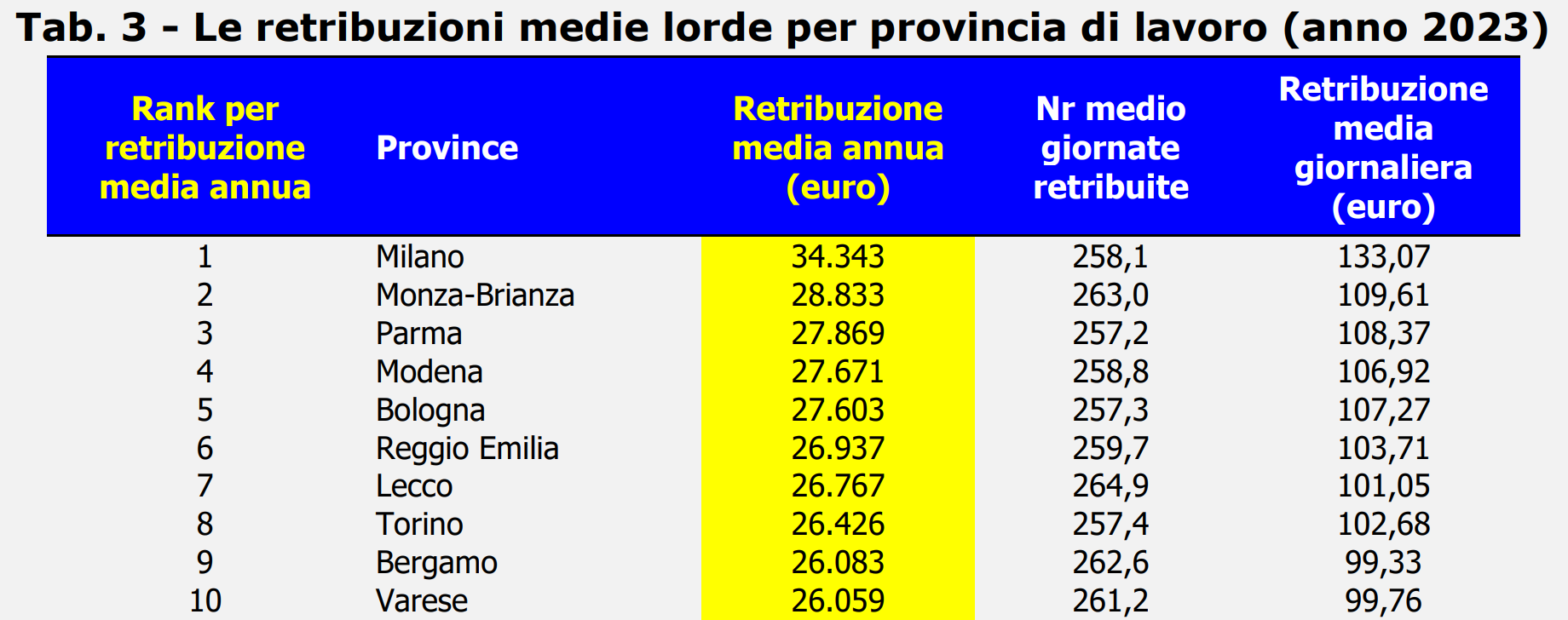In the north we work 27 days a year more than the South (« but not because of the » scaldesophatic « »))

Economy submerged and precarious the main reasons of this gap. This was certified by the Cgia Study Office of Mestre. In Lecco the productivity record
In the North, on average 255 days a year, in the South 228, in other words, in other words, The employees of the North every twelve months stamp the 27 -day tag more than the southern colleagues. A ‘states aanalyses of the Mestre Cgia Studies Office on INPS and ISTAT data whose results were released online on Saturday 10 May. «And how do you explain this difference? Certainly not because in the North employed and workers are gods tireless heroeswhile in the South there is a widespread presence of « Sandsophatic » who avoid offices and factories – specify the authors of the report to the dresses of (serious) misunderstandings -. Absolutely not, the reading key cannot be founded on these commonplaces».
Submerged and precarious economy
Two, for what emerged, the main reasons behind the aforementioned gap. The first: «AVery widespread submerged economy Which in the southern regions has a dimension that cannot be found in the rest of the country which, statistically, does not allow to count the hours worked irregularly « . The second: «A labor market that in the South is characterized by so much precariousnessfrom a widespread presence of involuntary part time, especially in services, by many seasonal seasonal in the receptive and agriculture sector that greatly lower the average of the hours worked « .
Work, news and insights
Differential (almost) identical
As is natural that – we still read -, « in the geographical areas of the country where the hours worked are higher, Productivity is also greater and consequently salaries and wages are heavier». In this respect, it is interesting to note that the two variables follow a substantially proportional trend. If in fact on the one hand the differential between the average daily wages of the North and South is of the 35% (104 euros gross against 77, according to the latest available data), on the other that relating to productivity amounts to 34%.
Double Lombard record
More in detail, private employees with the greatest average number of days worked per year are those of the provinces of Lecco (264.9 days), Biella (264,3) e Vicenza (263.5). Negative records instead for those of the provinces of Rimini (212.5), Nuoro (205,2) e Vibo Valentia (193,3). As for salaries, entrepreneurs provide the most consistent wages to Milan (34,343 euros per year, always on average), Monza-Brianza (28,833) e Parma (27,869), while the lowest a Cosenza (14,817) and in the aforementioned Nuoro (14,676) e Vibo Valentia (13,388). National averages: 246.1 worked days and 23,662 euros in salary.

« Decentralized bargaining more »
In light of these evidence, the authors of the report point out that, « as the CNEL also had to report, The problem of poor workers would not seem to be attributable to the minimum too low tablesbut to the fact that during the year these people work « little ». Therefore, more than establishing a minimum wage by law, the abuse of some reduced contracts should be contrasted « . Ready to use solutions: « Continue in cutting the irrepef and more spread decentralized bargaining». This is because – concludes La Cgia -, « having a share of workers covered by the national collective bargaining among the highest in Europe (almost 99% of the total employees of the private sector), We should « push » to further spread second level bargainingrewarding, in particular, the decontribution and achievement of productivity goals ».








/s3/static.nrc.nl/images/gn4/stripped/data132125071-39cc7f.jpg|https://images.nrc.nl/M-tD35RX6alzNVGh3gnvNjQN9Wk=/1920x/filters:no_upscale()/s3/static.nrc.nl/images/gn4/stripped/data132125071-39cc7f.jpg|https://images.nrc.nl/YCBJIUWiNCKgM8VsLNUqrM25Jek=/5760x/filters:no_upscale()/s3/static.nrc.nl/images/gn4/stripped/data132125071-39cc7f.jpg)